Emergency HVAC Old Windsor
Find top 24/7 HVAC Repair in Old Windsor
Receive 3 FREE Emergency HVAC Service quotes for your project today! Compare profiles, reviews, accreditations, portfolio, etc... and choose the best deal.
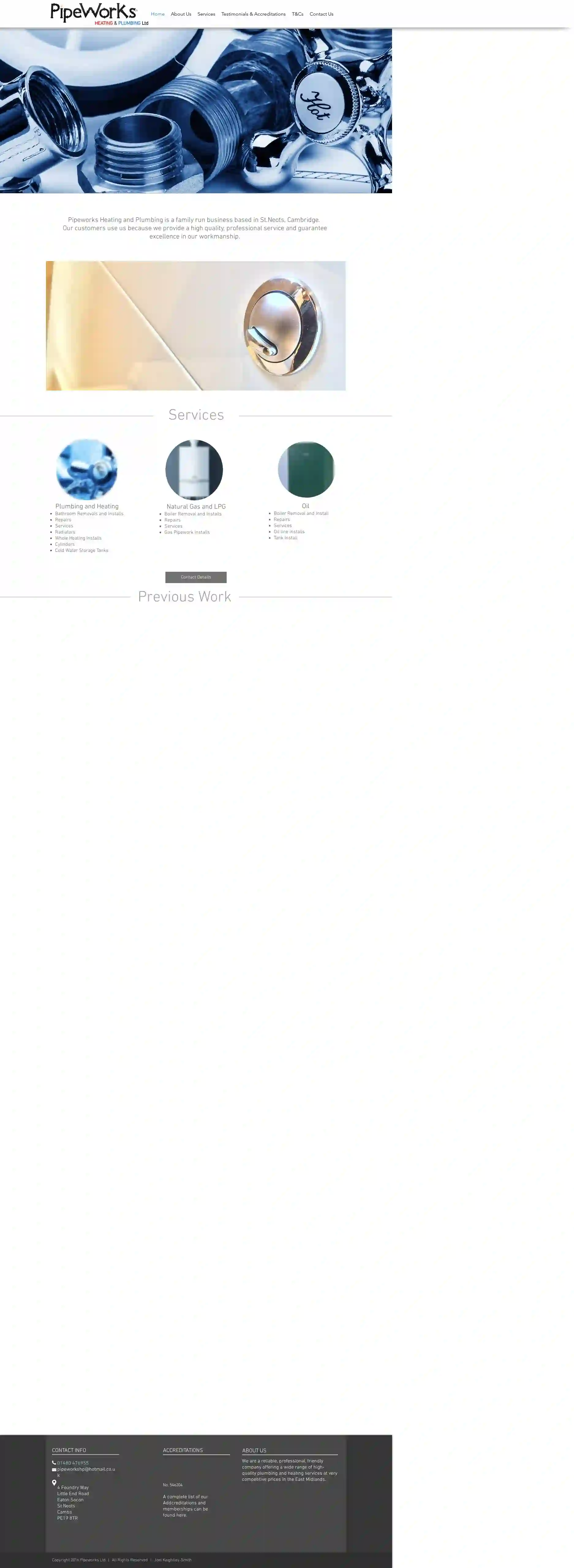
Pipeworks Heating & Plumbing
4.99 reviewsLittle End Road, 4 Foundry Way, St Neots, PE19 8TR, GBPipeworks Heating and Plumbing is a family run business based in St.Neots, Cambridge. Our customers use us because we provide a high quality, professional service and guarantee excellence in our workmanship. We are a reliable, professional, friendly company offering a wide range of high-quality plumbing and heating services at very competitive prices in the East Midlands.
- Services
- Why Us?
- Accreditations
- Gallery
Get Quote
EOGB Energy Products Ltd
54 reviews5 Howard Road, Eaton Socon, PE19 8ET, GBEOGB is a leading manufacturer and distributor of oil, gas and dual-fuel burners for domestic, commercial and industrial applications. We are also the principal supplier of high-quality Baltur industrial gas, oil and dual fuel burners to the UK market, featuring outputs ranging from 17kW to 45MW. Our own XSeries range of domestic and light commercial oil burners are designed to fit virtually any boiler. We also develop burners for specialist applications such as low voltage requirements. EOGB is constantly working to research and develop revolutionary new technology – we have recently unveiled our Sapphire Ultra Low NOx, Domestic Oil Boiler which features a fully modulating operation and blue flame. Above everything, EOGB are passionate about providing the best service for you. From pre-sales enquiries to on-site assessments and commissioning, tap into our extensive knowledge and experience. Our range of specialist training courses and assessments are offered from our purpose-built facility in St Neots, Cambridgeshire alongside commercial burner training taking place at the state-of-the-art Baltur facility in Bologna, Italy. With nationwide next-day delivery service on industry standard components your requirements can be met, however simple or complex.
- Services
- Why Us?
- Accreditations
- Gallery
Get Quote
Preferred plumbing and heating LTD
4.723 reviewsCambridgeshire, UK, 123 Main Street, Cambridge, CB1 1AA, GBPreferred Group is a construction company that has been in business for over 15 years. We pride ourselves on being rated as one of the most reliable and professional construction companies in the area. We offer a wide range of services including boiler installation, plumbing and heating, building, and electrical services. Our team of experienced professionals is dedicated to providing high-quality workmanship and excellent customer service. We are proud to provide renewable energy services such as solar, air and ground energy resources for both domestic and commercial properties throughout Cambridgeshire. We also offer a free quote service and a 24/7 emergency call-out service. Contact us today to learn more about our services and how we can help with your next construction project.
- Services
- Why Us?
- Accreditations
- Our Team
- Testimonials
- Gallery
Get Quote
Climatise Solutions Ltd
53 reviewsUnit 424 Great North Road, St Neots, PE19 7RS, GBClimatise Solutions Ltd is a family-founded company based in St Neots, Cambridgeshire, with over 30 years of experience in providing climate-controlled solutions. We specialize in the design and installation of air conditioning systems for both commercial and domestic clients. Our services also encompass ventilation, extraction, heat recovery, and commercial refrigeration. We proudly serve a wide range of areas, including St Neots, Bedford, Huntingdon, St Ives, and Peterborough. At Climatise Solutions, we are dedicated to creating the perfect temperature-controlled environment for your needs. Contact us today for a free, no-obligation survey and quotation. Why Choose Us? Free site survey on all enquiries within a 40-mile radius of St Neots Free advice, design, and quotation for all customers to help them make the right choice for their individual budget Over 30 years of experience serving local businesses and domestic customers in St Neots and throughout Cambridgeshire After-sales care and service plans provided through our service and maintenance packages on all our installations
- Services
- Why Us?
- Our Team
- Testimonials
- Gallery
Get Quote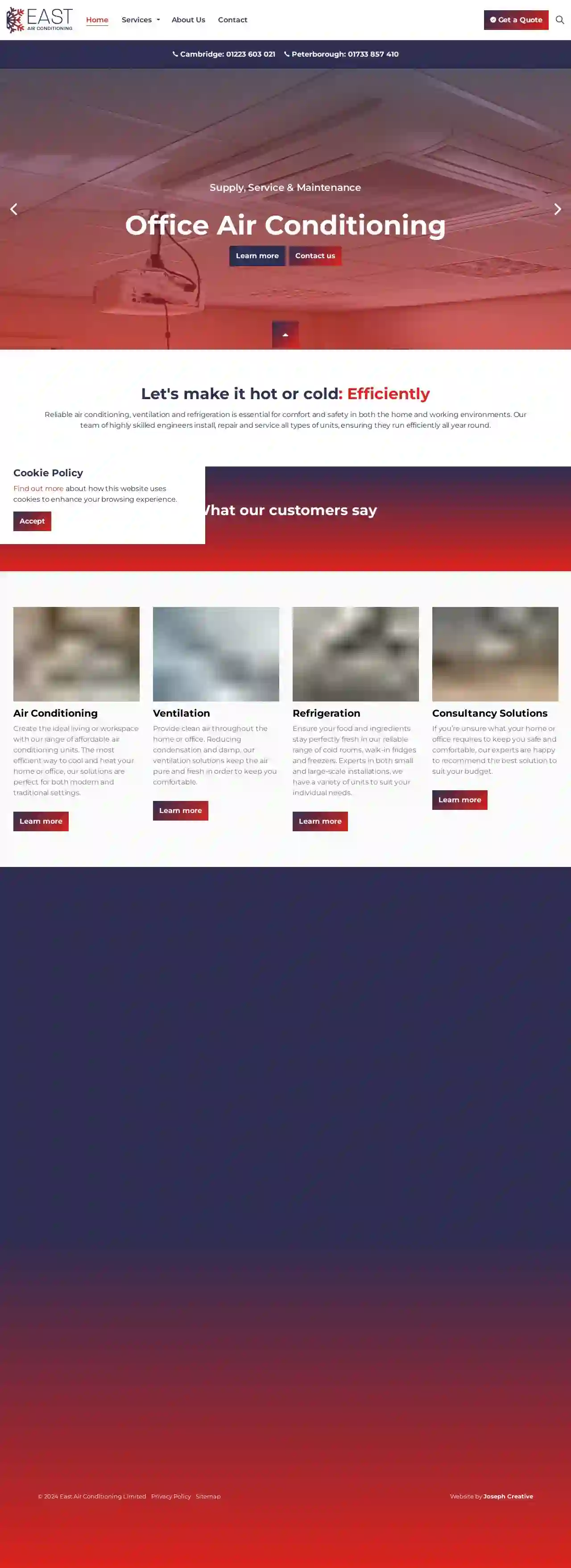
East Air Conditioning Services Limited
5103 reviewsUnit 23 Brookside Industrial Estate, Sawtry, PE28 5SB, GBEast Air Conditioning Services for Homes & Offices. We offer installation, service packages and repairs for a huge range of systems including domestic, commercial and industrial. Our team of highly skilled engineers install, repair and service all types of units, ensuring they run efficiently all year round. We pride ourselves on being a progressive company with a very personal approach to all aspects of our work. We believe it's important to look ahead with every aspect of our installations and ensure that your systems will be the best for today as well as tomorrow.
- Services
- Why Us?
- Our Team
- Gallery
Get Quote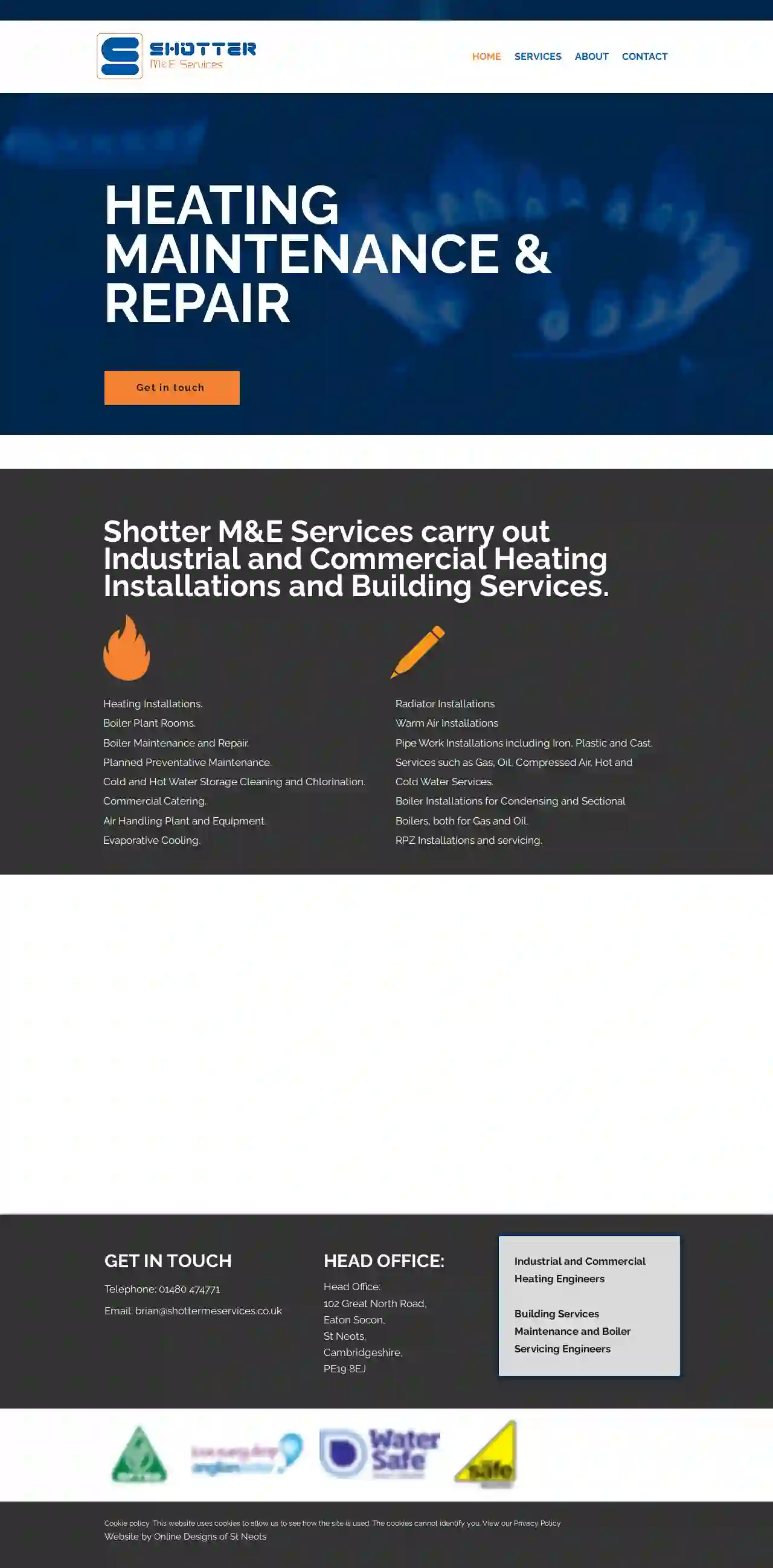
Shotter M & E Services
102 Great North Road, Eaton Socon, PE19 8EJ, GBShotter M&E Services carry out Industrial and Commercial Heating Installations and Building Services. We cover Cambridgeshire, Bedfordshire and Milton Keynes. Our services include: Heating Installations Boiler Plant Rooms Boiler Maintenance and Repair Planned Preventative Maintenance Cold and Hot Water Storage Cleaning and Chlorination Commercial Catering Air Handling Plant and Equipment Evaporative Cooling We also offer: Design & Installation Radiator Installations Warm Air Installations Pipe Work Installations including Iron, Plastic and Cast Services such as Gas, Oil, Compressed Air, Hot and Cold Water Services Boiler Installations for Condensing and Sectional Boilers, both for Gas and Oil RPZ Installations and servicing We work with a wide range of customers, including: Industry of all sizes from small units to multi-million pound turnover companies Restaurants NHS including Hospitals, Health Centres and Homes for the Elderly Schools & colleges Greenhouses Warehouses Large & small office complexes Hotels, churches etc Get in touch Telephone: 01480 474771 Email: [email protected] HEAD OFFICE: 102 Great North Road, Eaton Socon, St Neots, Cambridgeshire, PE19 8EJ Industrial and Commercial Heating Engineers Building Services Maintenance and Boiler Servicing Engineers Cookie policy: This website uses cookies to allow us to see how the site is used. The cookies cannot identify you. View our Privacy Policy Website by Online Designs of St Neots
- Services
- Why Us?
- Our Team
- Gallery
Get Quote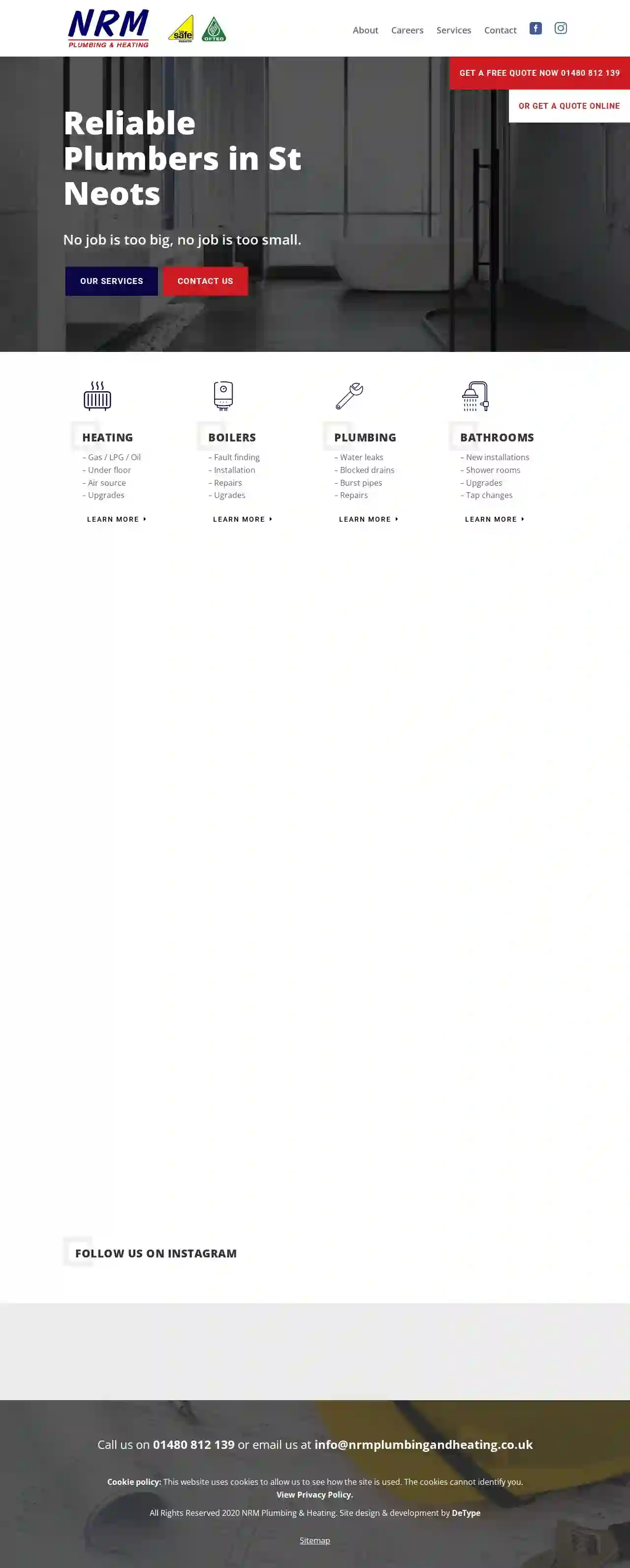
N R M Plumbing & Heating LTD
4.89 reviewsSt Neots, Bedfordshire, PE19 1, GBNRM Plumbing & Heating is a local business based in St Neots, Bedfordshire, providing all aspects of plumbing and heating work. With over 14 years of experience, our team of trusted plumbers and heating engineers are dedicated to providing excellent work. We help both domestic and commercial customers, no job is too big or too small. Our team has a great reputation and is known for being reliable, efficient, and professional. We are fully accredited and insured, and our work is guaranteed.
- Services
- Why Us?
- Accreditations
- Our Team
- Testimonials
- Gallery
Get Quote
Unibar Plumbing & Heating Ltd
51 reviewsEaton Socon, St.Neots, 5 Vulcan Way, St Neots, PE19 8TS, GBAs one of the leading local businesses in the Saint Neots area, we attribute our reputation to the lasting customer relationships we’ve developed throughout the years. We believe that all of our customers deserve the highest level of service, and we are committed to providing just that. Explore the rest of our site to learn more about what we have to offer, and get in touch with any questions. Unibar Plumbing & Heating Ltd is here for you.
- Services
- Why Us?
- Gallery
Get Quote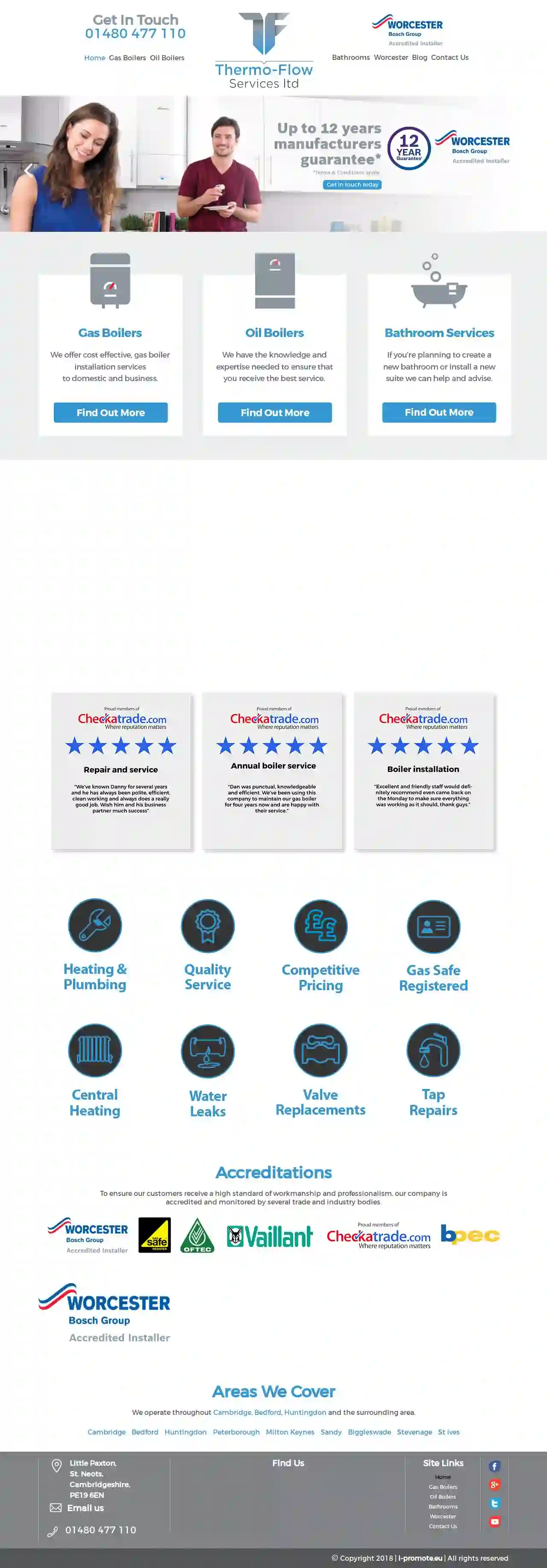
Thermo-Flow Services Ltd
4.515 reviewsGreat North Road, Unit J, The Conservatory Village, St. Neots, PE19 6EN, GBThermo-Flow Services Ltd is a friendly, polite team of engineers covering the Cambridgeshire area, who take pride in their work and always maintain a very high quality finish. We will always provide you with a competitive price and will always try and save you money where possible. Thermo-Flow Services philosophy on plumbing is simple. Bathrooms and kitchens are personal spaces for you and your family and the finished article must be perfect. Therefore, with trusted contacts of Tiler’s to Electricians we can ensure the completed job will be flawless. Boilers are a vital part of the home, so with Thermo-Flow Services passion towards its work it guarantees that, whatever the job, whether it’s a regular service to a full system upgrade, it will be done methodically and professionally to suit your lifestyle and your budget. We are part of the VAILLANT ADVANCE TEAM. We can offer not only Vaillant’s excellent customer service but also a 5 and 7-year warranty on their Boilers. To ensure our customers receive a high standard of workmanship and professionalism, our company is accredited and monitored by several trade and industry bodies.
- Services
- Why Us?
- Accreditations
- Gallery
Get Quote- Ai
Airway Group
4.756 reviewsWindsor, GB- Services
- Why Us?
Get Quote
Over 12,692+ HVAC Contractors on our platform
Our HVAC experts operate in Old Windsor & beyond!
HVACCompaniesHub has curated and vetted Top HVAC Contractors arround Old Windsor. Find a top & trustworthy business today.
Frequently Asked Questions About Emergency HVAC Services
- A rotten egg smell odor
- Hissing or whistling sounds near gas lines or appliances
- Blowing dirt or bubbles in standing water
- Dead or discolored vegetation near gas lines
- Physical symptoms like dizziness, nausea, or headaches
- Control Humidity: Keep indoor humidity levels between 30% and 50%.
- Regularly Change Air Filters: Change your air filters at least every three months.
- Clean Drip Pans and Condensate Drains: Regularly inspect and clean your AC unit's drip pans and condensate drains to prevent standing water.
- Ensure Proper Ventilation: Adequate ventilation helps to reduce moisture buildup.
- Schedule Professional Duct Cleaning: Consider regular air duct cleaning to improve indoor air quality.
- Turn off the system: Switch off your HVAC system at the thermostat.
- Turn off the power: Locate the circuit breaker for your HVAC system and turn it off.
- Wait: Wait a few minutes for the system to completely power down.
- Restore power: Turn the circuit breaker back on.
- Turn on the system: Switch your HVAC system on at the thermostat.
How do I know if I have a gas leak?
How can I prevent mold in my HVAC system?
How do I reset my HVAC system?
What is a humidifier, and should I use one with my HVAC system?
How do I know if I have a gas leak?
- A rotten egg smell odor
- Hissing or whistling sounds near gas lines or appliances
- Blowing dirt or bubbles in standing water
- Dead or discolored vegetation near gas lines
- Physical symptoms like dizziness, nausea, or headaches
How can I prevent mold in my HVAC system?
- Control Humidity: Keep indoor humidity levels between 30% and 50%.
- Regularly Change Air Filters: Change your air filters at least every three months.
- Clean Drip Pans and Condensate Drains: Regularly inspect and clean your AC unit's drip pans and condensate drains to prevent standing water.
- Ensure Proper Ventilation: Adequate ventilation helps to control humidity levels.
- Schedule Professional Duct Cleaning: Consider regular air duct cleaning to remove mold and other contaminants.
How do I reset my HVAC system?
- Turn off the system: Switch off your HVAC system at the thermostat.
- Turn off the power: Locate the circuit breaker for your HVAC system and turn it off.
- Wait: Wait a few minutes for the system to completely power down.
- Restore power: Turn the circuit breaker back on.
- Turn on the system: Switch your HVAC system on at the thermostat.